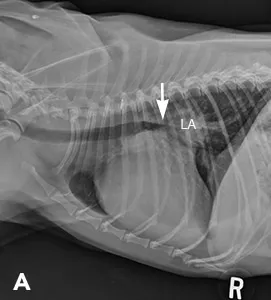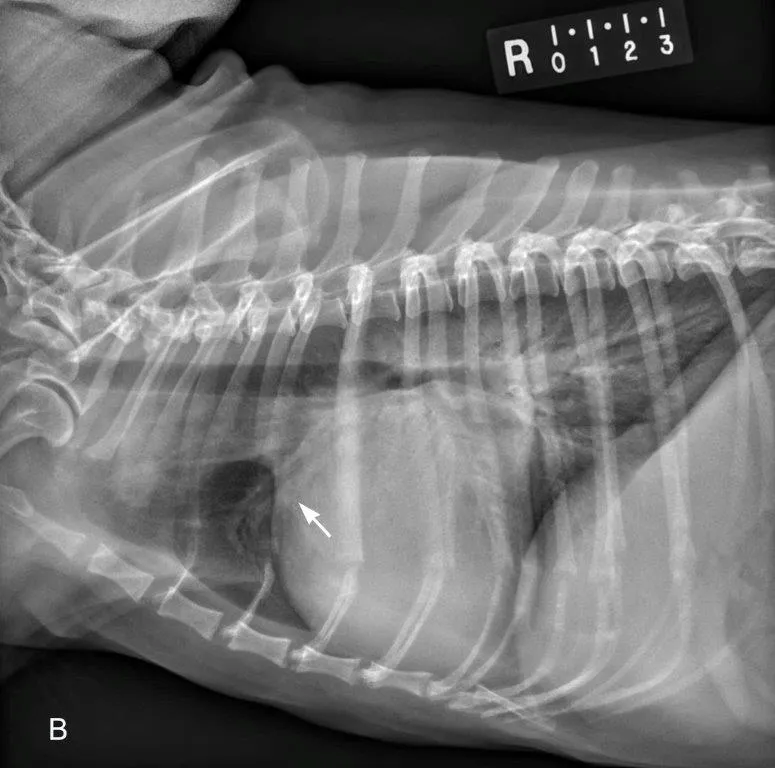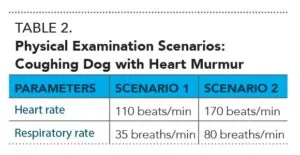Heart failure in dogs is a serious and complex condition that requires careful management. This comprehensive guide delves into the intricacies of heart failure in canine companions, exploring the common diseases that lead to it, and offering practical strategies for diagnosis and ongoing care. Understanding these aspects is crucial for pet owners aiming to provide the best possible quality of life for their dogs.
What is Heart Failure in Dogs?
Heart failure in dogs is a condition where the heart can no longer pump blood effectively to meet the body’s needs. This can arise from either congenital (present at birth) or acquired heart diseases. Depending on the specific ailment, the failure can affect either the left or right side of the heart, or both. The consequences manifest in various ways, including fluid retention (often termed “backward failure”) or reduced blood circulation (known as “forward failure”). While the underlying cause can vary with age and breed, common chronic conditions like degenerative mitral valve disease (DMVD) and dilated cardiomyopathy (DCM) are often managed with a combination of diuretics, ACE inhibitors, and pimobendan, with other medications added as needed.
The Progression to Congestive Heart Failure
As a dog’s heart function declines, neurohormonal systems like the renin-angiotensin-aldosterone system become activated. This complex process leads to an increase in fluid volume within the heart and blood vessels, escalating preload and stretching the heart chambers. Consequently, hydrostatic pressure increases in the veins supplying the atria. This ultimately results in either fluid buildup in the lungs (pulmonary edema) in left-sided heart failure, or fluid accumulation in the abdomen and chest cavity (ascites and/or pleural effusion) in right-sided heart failure.
Degenerative Mitral Valve Disease (DMVD)
DMVD stands as the most prevalent acquired heart disease in dogs. Its hallmarks include:
- Heart Murmur: This is caused by leaky mitral and sometimes tricuspid valves, leading to dilation of the left atrium and left ventricle.
- Progressive Dilatation: The left ventricle enlarges over time, eventually impairing its ability to pump effectively.
- Left Atrial Enlargement: Significant enlargement of the left atrium can trigger irregular heart rhythms (atrial arrhythmias).
- Pulmonary Hypertension: Increased pressure in the lung’s blood vessels can contribute to symptoms like difficulty breathing and fainting.
It’s important to note that not all dogs with DMVD develop heart failure. Dogs with enlarged hearts are at higher risk, but only about 30% of those with asymptomatic DMVD will eventually show clinical signs requiring treatment.
 Radiograph showing heart enlargement in a dog with DMVD*Figure 1A. Radiographs illustrating heart enlargement in dogs with DMVD, including left atrial enlargement. This image depicts a dog with a chronic cough despite heart failure medications, potentially due to mainstem bronchial compression.*
Radiograph showing heart enlargement in a dog with DMVD*Figure 1A. Radiographs illustrating heart enlargement in dogs with DMVD, including left atrial enlargement. This image depicts a dog with a chronic cough despite heart failure medications, potentially due to mainstem bronchial compression.*
Dilated Cardiomyopathy (DCM)
DCM is a primary disease affecting the heart muscle itself. It typically has a long asymptomatic phase, followed by either sudden death due to arrhythmias or the development of heart failure. Key changes in DCM include:
- Reduced Systolic Function: Primarily affecting the left ventricle’s ability to contract.
- Ventricular and Atrial Dilation: The left ventricle and, to a lesser extent, the left atrium enlarge due to weakened pumping and increased fluid volume.
- Mitral Regurgitation: In some cases, the enlarged heart stretches the mitral valve, preventing it from closing properly, leading to leakage.
Arrhythmias are common in DCM, both in its early and later stages, and often necessitate treatment. Common arrhythmias include atrial fibrillation, premature ventricular complexes, and ventricular tachycardia.
Cough: Heart Failure or Respiratory Issue?
A cough in dogs is a common symptom that doesn’t always point to heart failure. It can also be caused by an enlarged heart pressing on the airways (bronchial compression) or by primary lung or airway diseases. A persistent, harsh cough that ends in a gag, especially in a dog with a good appetite and normal energy levels, is less likely to be solely due to heart failure. Coughs from bronchial compression can precede congestive heart failure (CHF) and may persist even after fluid in the lungs has been treated. Key questions to ask about a cough include its duration, character (harsh, gagging), and the dog’s appetite and activity levels.
 Radiograph showing pulmonary edema in a dog with CHF*Figure 1B. Radiographs illustrating pulmonary venous enlargement and an interstitial pattern indicative of pulmonary edema, consistent with CHF. This image shows a dog experiencing acute cough and breathing difficulties.*
Radiograph showing pulmonary edema in a dog with CHF*Figure 1B. Radiographs illustrating pulmonary venous enlargement and an interstitial pattern indicative of pulmonary edema, consistent with CHF. This image shows a dog experiencing acute cough and breathing difficulties.*
Tips for Diagnosing and Managing Heart Failure in Dogs
Effective management of heart failure involves a thorough diagnostic process and tailored treatment plan. Here are six practical tips:
1. Consider Patient Signalment
A dog’s age and breed offer valuable clues. Younger dogs (under 2 years) are more prone to congenital heart defects, while older dogs are more likely to develop acquired diseases. Certain breeds have predispositions: small breeds like Cavalier King Charles Spaniels are commonly affected by DMVD, whereas large breeds such as Doberman Pinschers and Great Danes are more susceptible to DCM. Understanding these breed predispositions can help narrow down potential diagnoses.
2. Be a Detective: Ask Detailed Questions
Gathering a comprehensive history and performing a thorough physical examination are critical. Inquire about any family history of heart disease, the onset and progression of clinical signs, and observe for physical indicators such as heart murmurs, rapid heart rate (sinus tachycardia), arrhythmias, gallops, or weak pulses. A history of clinical signs like coughing, difficulty breathing, or decreased exercise tolerance, especially when combined with physical examination findings, can strongly suggest heart failure.
| Signs Supporting Heart Failure | Signs Suggesting Other Causes |
|---|---|
| Cough | Mild or absent cough |
| Tachypnea (rapid breathing) | Normal respiratory rate |
| Dyspnea (difficulty breathing) | Normal breathing |
| Exercise intolerance | Normal activity level |
| Lethargy | Normal energy |
| Edema (swelling) | No edema |
| Ascites (abdominal fluid) | No ascites |
| Pleural effusion (chest fluid) | No pleural effusion |
Table 1. Clinical signs that may support or suggest against heart failure.
Consider the case of an 8-year-old Bichon Frise with a cough and heart murmur. While heart failure is possible, further details are needed. Increased heart and respiratory rates, as seen in Scenario 2 of Table 2, would be more indicative of heart failure compared to normal rates in Scenario 1.
 Table 2 showing comparison of clinical scenarios*Table 2. Comparison of clinical scenarios relevant to diagnosing heart failure.*
Table 2 showing comparison of clinical scenarios*Table 2. Comparison of clinical scenarios relevant to diagnosing heart failure.*
3. Know When to Test
- Thoracic Radiographs: Essential for evaluating coughs and respiratory distress, assessing heart size, and monitoring treatment effectiveness. They can reveal pulmonary edema, enlarged heart chambers, and help rule out other lung conditions.
- Serum Biochemistries: Important for monitoring kidney function and electrolyte balance, especially in dogs receiving diuretics and ACE inhibitors.
- Echocardiography: A powerful tool to determine the specific type of heart disease, assess heart muscle function, and identify complications like pulmonary hypertension. While it doesn’t directly diagnose CHF, it provides crucial information for treatment planning. Echocardiography is typically performed once the dog is stable.
4. Consider Comorbidities and Drug Interactions
Adult dogs often have other health issues (kidney disease, hyperadrenocorticism, etc.) that must be considered when prescribing heart medications. Potential adverse effects and drug interactions between cardiac drugs, diuretics, ACE inhibitors, and other medications need careful evaluation to ensure the safety and efficacy of the treatment plan.
5. Make Recommendations for Home Care
Involve owners in their dog’s care by establishing a regular recheck schedule for monitoring and adjustments. Educate them on recognizing warning signs like worsening cough, breathing difficulties, or lethargy. Encourage owners to track their dog’s resting respiratory rate at home, as an elevated rate can be an early indicator of a problem. Promote a healthy diet, advise against high-salt foods, and set realistic expectations for activity levels. Ultimately, success is measured by both the duration of survival and the quality of life achieved.
6. Establish a Relationship with a Local Cardiologist
For complex cases or when initial therapy is ineffective, consulting a veterinary cardiologist can be highly beneficial. They can provide expert diagnosis, develop advanced treatment strategies, and stay current with the latest guidelines and research, ensuring the best possible outcome for the dog.
Conclusion
Managing heart failure in dogs is a journey that requires dedication, knowledge, and a proactive approach. By understanding the underlying causes, employing thorough diagnostic methods, and implementing tailored treatment and home care plans, owners can significantly improve their dogs’ quality of life and longevity. Regular veterinary check-ups and open communication with your veterinarian are paramount in navigating this challenging condition.
